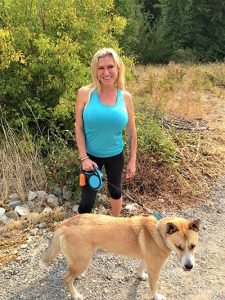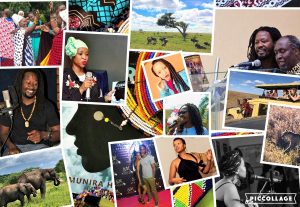
Joanna Cockerline with her dog Charlie, enjoying the hiking opportunities on UBCO’s beautiful campus
Joanna Cockerline is cross-appointed in the Department of English and Cultural Studies and the Faculty of Management. Drawing on her love of literature and writing, she teaches English courses such as ENGL 112; based on her experience as a professional consultant for top Canadian and international firms, she shares her expertise in Management Communications courses. Additionally, she is the Program Director for the Go Global Tanzania – Community, Creativity, and Communications program that brings UBC students to East Africa. In addition to her teaching and private sector work, she is currently completing a novel focused on the homeless and sex work communities in Kelowna, inspired by her volunteer work with marginalized women who live and work on Kelowna’s streets.
We sat down with Joanna to find out a bit more about her teaching and research interests.
Tell us about your research interests.
My background is in critical theory, cultural studies, Canadian literature, East African literature, and creative writing, and I find these directions continue to inspire me. Most recently, I have been engaging with a lot of contemporary writing and human rights activism emerging out of East Africa, where there is a vibrant literary and activist scene. I regularly travel to Kenya and Tanzania to meet with authors who have since become dear friends, and am excited to share these connections via author visits in the context of Go Global Tanzania; I also share these insights in my other courses, bringing in international perspectives and a decolonizing lens.

A collage of Go Global Tanzania experiences, authors, and activists, such as Munira Hussein and Ndungi Githuku
Beyond my teaching at UBCO, I run my own consulting business, providing technical writing, editing, and professional communications courses to leading Canadian and international firms. I enjoy sharing the skills and strategies I apply in these contexts with my students to share industry insights and help professionalize their writing.
I’m also at work on a novel focused on the sex work and homeless communities in Kelowna. I love exploring ideas and perspectives from a creative point of view, and always enjoy it when my students approach me with their own writing ideas.
What kind of learning experiences do offer your students
In my English and Management Communications courses, I believe in giving students a lot of choice and freedom in their assignments so they can explore directions that matter to them. Within course parameters, I encourage my students to develop their own research essay topics and management communications projects so that they can pursue trajectories about which they truly care.
For Go Global Tanzania – Community, Creativity, and Communications, we are immersed in the local community, read a diverse range of East African literature, and have opportunities to participate in a wide range of cultural and environmental experiences; I also arrange for authors and human rights activists to visit us and share their insights in an intimate, conversational setting. In addition to immersing themselves in East African culture and literature, students have the opportunity to design and pursue self-directed projects, and can include creative pursuits such as creative writing, photography, and art as part of their learning. In the most recent program that ran, before Covid, students were so inspired they went on to write newspaper articles about their experiences, publish a chapbook of poetry, and hold an interactive photography, writing, and multi-media exhibit in UBCO’s FINA Gallery.
What most excites you about your field of work
In the context of East African literature, the vibrant and emerging literary scene, particularly out of Nairobi, excites me, and I have really enjoyed getting to know a diverse range of authors personally, arranging for students to connect with them, and bringing their insights into my teaching.
When it comes to professional and technical writing and editing, I’ve had the opportunity to contribute to major engineering and environmental projects with a cumulative capital value of over $6 Billion – working with diverse interdisciplinary teams on innovative pursuits of all scales is exciting, and enables me to share these insights and strategies with my students.
Writing my novel, Still, has also been deeply rewarding, especially as I listen to the diverse voices on the street. Members of the sex work and homeless communities have become my friends over the years, and they are excited to see their perspectives reflected in the book as a way of making their perspectives heard. And the process of writing, of working with language, is continually inspiring.
I love seeing students make discoveries and explore their passions, encountering new ideas and pushing themselves to discover new capabilities. I’m always learning myself and encourage my students to take an open-minded, inquisitive approach to their learning and discovery.
What do you enjoy about living here and working at UBC Okanagan
At UBCO, I love the freedom we have to design programs and courses that let students explore their interests and develop the skills they need to succeed in university and beyond.
As for living here, I absolutely love it. I am in love with the landscape and feel a deep connection with the land, from its mountains to its desert climate to its trees to its lake. I’m always hiking, writing outdoors, and enjoying landscape and wildlife photography. There are so many incredible places to explore and enjoy, and I would encourage all students to get outside and get to know this beautiful unceded Syilx Territory that we are privileged to call home. It’s an incredible place to live and learn.